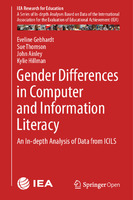Gender Differences in Computer and Information Literacy
An In-depth Analysis of Data from ICILS
Author(s)
Gebhardt, Eveline
Thomson, Sue
Ainley, John
Hillman, Kylie
Language
EnglishAbstract
This open access book presents a systematic investigation into internationally comparable data gathered in ICILS 2013. It identifies differences in female and male students’ use of, perceptions about, and proficiency in using computer technologies. Teachers’ use of computers, and their perceptions regarding the benefits of computer use in education, are also analyzed by gender. When computer technology was first introduced in schools, there was a prevailing belief that information and communication technologies were ‘boys’ toys’; boys were assumed to have more positive attitudes toward using computer technologies. As computer technologies have become more established throughout societies, gender gaps in students’ computer and information literacy appear to be closing, although studies into gender differences remain sparse. The IEA’s International Computer and Information Literacy Study (ICILS) is designed to discover how well students are prepared for study, work, and life in the digital age. Despite popular beliefs, a critical finding of ICILS 2013 was that internationally girls tended to score more highly than boys, so why are girls still not entering technology-based careers to the same extent as boys? Readers will learn how male and female students differ in their computer literacy (both general and specialized) and use of computer technology, and how the perceptions held about those technologies vary by gender.
Keywords
Education; Gender identity in education; Education—Data processing; International education ; Comparative education; AssessmentDOI
10.1007/978-3-030-26203-7Publisher
Springer NaturePublisher website
https://www.springernature.com/gp/products/booksPublication date and place
Cham, 2019Series
IEA Research for Education,Classification
Education
Education: examinations and assessment
Educational equipment and technology, computer-aided learning (CAL)


 Download
Download Web Shop
Web Shop